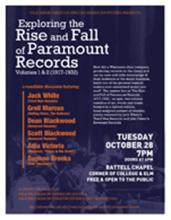Doors open at 6pm | Directions | Parking
**Battell Chapel is wheel chair accessible from Temple St.,(which is about a half block from the corner of Temple and Elm)
Enter Old Campus on Temple St., going through the wrought-iron gateway, and turn right on the pathway toward Elm St. to enter the rear of Battell Chapel.
“Exploring the Rise and Fall of Paramount Records” will present an evening of musical exploration and conversation, unpacking the label’s rich history and celebrating the release of Volumes 1 & 2 of The Rise and Fall of Paramount Records 1917-1932, an epic omnibus jointly released by Jack White’s Third Man Records and Revenant Records.
The program will feature a dynamic conversation between roundtable participants and highlight a profound listening experience as each participant plays a selected song in its entirety and discusses its deeper implications and dimensions.
Roundtable discussion featuring:
Jack White (Third Man Records, Lazaretto)
Greil Marcus (Rolling Stone, The Believer, The History of Rock ‘n Roll in Ten Songs)
Dean Blackwood (Revenant Records)
Scott Blackwood (Revenant Records)
Adia Victoria (Musician, “Stuck in the South”)
Daphne Brooks (Professor, African American Studies & Theater, Yale University)
Background
Paramount Records was founded on a modest proposition: produce records as cheaply as possible, recording  whatever talent was available. Over its lifetime (1917-1932), the label compiled a dizzying array of performers still unrivaled to this day, spanning early jazz titans (Louis Armstrong, Fats Waller), blues masters (Charley Patton, Skip James), American divas (Ma Rainey, Ethel Waters), gospel, vaudeville, hillbilly, and more. But how did a Wisconsin chair company, run by men with little knowledge of their audience or the music business, build one of the greatest musical rosters ever assembled under one roof? How and why were its fortunes directly linked to the Great Migration, and what is Paramount’s legacy today?
whatever talent was available. Over its lifetime (1917-1932), the label compiled a dizzying array of performers still unrivaled to this day, spanning early jazz titans (Louis Armstrong, Fats Waller), blues masters (Charley Patton, Skip James), American divas (Ma Rainey, Ethel Waters), gospel, vaudeville, hillbilly, and more. But how did a Wisconsin chair company, run by men with little knowledge of their audience or the music business, build one of the greatest musical rosters ever assembled under one roof? How and why were its fortunes directly linked to the Great Migration, and what is Paramount’s legacy today?
Sponsored by the Yale Department of African American Studies, the Program in American Studies, and the Program in Theater Studies, Women’s, Gender, and Sexuality Studies at Yale, and Sound Hall.
